History of the Second International (original) (raw)
International Socialist Congresses
See more: Encyclopedia of Marxism
1. 1889
1889 is generally considered as the first year of the Second International, though participants were split between two Congresses. There is a separate page for the two Congresses and the debates around them. One outcome was that May Day was declared as an international working-class holiday.
2. 1891 (Brussels)
The Marxist organising committee eventually decided to join the Possibilists in Brussels for the 1891 Congress. The Italian groups held a pre-conference in Milan, documented by Turati. Eleanor Marx wrote the report for the British.
3. 1893 (Zürich) Engels was elected honorary president of International Socialist Congress, but died in 1895. The Congress established the International Metalworkers Federation, uniting metalworkers across the world to this day.
- Report from Great Britain and Ireland by Eleanor Marx
- The Zurich Resolutions by E. Belfort Bax
- The New International by E. Belfort Bax
4. 1896 (London) affirmed right of nations to self-determination and opposition to colonialism.
- The Polish Question at the International Congress in London by Rosa Luxemburg
- Our Recent Congress by Wilhelm Liebknecht
- The Congress by J. Bruce Glasier (for the ILP)
5. September 1900 (Paris) Established a standing International Socialist Bureau composed of representatives of the socialist parties of all countries, its secretariat to be in Brussels. At this Congress, there was a split within the 28-strong Russian delegation. Lenin cast his vote for Plekhanov as the Russian delegate to the International, against Krichevsky, one of the editors of Rabocheye Dyelo.
- Some Reflections on the Paris Congress by E. Belfort Bax
- A report in the International Socialist Review
- Some Questions at the Paris Congress by Job Harriman
- The first meeting of the International Socialist Committee, Brussels, December 30, 1901
In 1903, the Russian party split between Bolsheviks and Mensheviks.
See the Stenographic Record of the Second Congress of the RSDLP.
6. 1904 (Amsterdam)
- Report of the Australian Socialist League
- Report on Colonies and Dependencies, by H. M. Hyndman
- Dresden Resolution of the National Convention of German Social Democracy
- Resolution on revisionism
- Resolution on May Day
- The Sixth International Socialist Congress, The Comrade
- A report in the International Socialist Review
- Full report in the International Socialist Review
- The International Socialist Congress by SPGB
- Keir Hardie, the ILP view of the Congress
- Flashlights of the Amsterdam Congress by Daniel de Leon
The Industrial Workers of the World (IWW) was founded in Chicago in June 1905, and over the next few years, the Social Democrats were active in a struggle against Anarcho-Syndicalism within the IWW.
- Letter to the Secretariat of the International Socialist Bureau, V. I. Lenin, 1905
- Report on the meeting of the International Socialist Bureau, Justice, 1906
- Report to the National Committee of the Socialist Party, Morris Hillquit, 1907
7. August 1907 (Stuttgart), there were 884 delegates from 25 nations including Argentina, Australia, Austria, Belgium, Bulgaria, Denmark, England, Germany, Italy, India, Japan, Norway, Poland, Russia, the USA and one delegate from South Africa. The First International Conference of Socialist Women was held just prior to the opening of the Congress.
- Resolution on Militarism
- Trade Union Resolution
- Resolution on Emigration and Immigration
- Resolutions on Woman Suffrage
- The International Socialist Women's Conference, Gerd Callesen [external link]
- The First International Conference of Socialist Women, Alexandra Kollontai
- Ruin of India by British Rule, report by Henry Hyndman
- Emigration and Immigration, report by Boris Frumkin
- Recent Progress of the Socialist and Labor Movements in the United States, Morris Hillquit [external link]
- The Stuttgart Congress, A. M. Simons
- The International Congress and Colonial Policy, E. Belfort Bax
- Immigration at Stuttgart, Louis B. Boudin
- The Socialist International and the British Trade Unions, Harry Quelch
The Fourth convention of the IWW in 1908 resulted in a split between “political actionists”, led by Daniel DeLeon of the SLP, and “direct actionists”, led by Vincent St. John and J.H. Walsh. DeLeon set up a rival “Detroit” IWW in opposition to the “Chicago” IWW who were opposed to participation in Parliament.
- Report from the first meeting of the International Socialist Bureau since the Stuttgart Congress, V. I. Lenin, 1908
- The Eleventh Session of the International Socialist Bureau, V. I. Lenin, 1909
8. August 1910 (Copenhagen). Second International Conference of Socialist Women held prior to opening of Congress, set International Women's Day for March 8 every year.
The International Socialist Congress and the International Socialist Women's Conference (minutes and resolutions) [external link]
Report of Socialist Party of the United States [external link]
The Copenhagen Congress, Justice, 23 July 1910
The International Conference, Justice, 3 September 1910
The Copenhagen Congress, Harry Quelch, Justice, 10 September 1910
The Eighth International Socialist Congress, Emil Stultz and William E. Bohm
The International Congress, J. Bruce Glasier for the ILP
International Socialist Congress of 1913, Bax, Hyndman, Quelch, October 1912
9. November 1912 Extraordinary Congress (Basel).
- Manifesto (alternate translation)
- The Basel Congress, J.H.W., Justice, 30 November 1912
1914 The final session of the International Socialist Bureau was held at Brussels on July 29, 1914 and “resolved unanimously that it shall be the duty of the workers of all nations concerned not only to continue but to further intensify their demonstrations against the war, for peace, and for the settlement of the Austro-Serbian conflict by international arbitration.” (the whole resolution)
10th International Socialist Congress in Vienna (cancelled). The congress was planned for the days between the 23 and 29 August 1914, but in July the Austrian Social Democratic Party had realized that because the threat of war had become imminent and because of the risk this would entail for the participants the congress could not be held in Vienna. Therefore the party suggested that the congress be held in another country. But the congress was never held as a result of the outbreak of war on 4 August 1914.
- Imperialism and Arbitration Courts, report by Hugo Haase
- Other documents (in German, French and English)
Since the outbreak of the World War I
- The Socialists and the War by William English Walling, 1915
- The American Socialists and the War, 1917
1915
March 26-28 (Berne, Switzerland): The Third International Conference of Socialist Women. Twenty-nine delegates from Britain, Germany, France, Holland, Switzerland, Russia and Poland attended the Conference.
September (Zimmerwald, near Berne) organised opposition to the War.
1916 April (Kienthal) follow-up to Zimmerwald Conference.
1917 July-August (Stockholm) did not convene due to delegates being prevented from attending. Final meeting of Zimmerwald group at Stockholm.
After the World War I
1919 February 3-10 (Berne International Conference)
1920
July-August 6th (Geneva), Congress of the Berne International.
December 5-8 (Berne) International Working Union of Socialist Parties: Manifesto adoped by the Conference
1922 April 2-5 Conference of the Three Internationals: The Second AND Third Internationals AND The Vienna Union, Official Report of the Conference between the Executives, held at the Reichstag, Berlin.
- Statement of the Comintern Delegation on the Manifesto Issued by the Conference of the Three Internationals, 5 April 1922
- The Results of the Berlin Conference of the Three Internationals, Karl Radek, April 1922
1923 May 21 (Hamburg) Establishment of the Labour and Socialist International through a merger of the Berne International and Vienna International.
1928 August 5-11 (Brussels) Third Congress of the Labour and Socialist International.
- Speech to the Third Congress of the Labour and Socialist International, Morris Hillquit, August 6, 1928
Other Social-democratic Parties in Europe
French Social Democracy
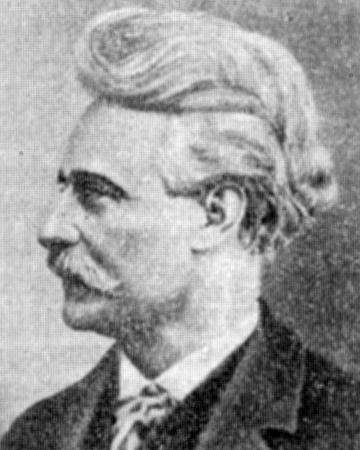 Paul Lafargue
Paul Lafargue
(1841-1911) Paul Lafargue was born in Cuba but studied medicine in France and became a follower of Proudhon. He met Marx and Engels while acting as a delegate to the First International and married Laura Marx in 1868, thereafter working closely with Marx and Engels and leading the Marxist wing within the Parti Ouvrier.
After the fall of the Paris Commune Paul and Laura fled to Spain but later settled in London. Lafargue was an influential speaker and writer, including works on ethical aspects of socialism. The couple commited suicide together in 1911. See Paul Lafargue Archive.
Jules Guesde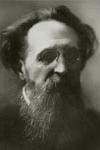 (1845-1922) Publisher of L'Egalité, leader of the Marxist wing of the French workers' movement. In 1879, together with Lafargue, he founded the French Workers' Party [_Parti ouvrier_]. In the 1880's and 90's Guesde led the fight against the Possibilists and opposed participation in Parliament. By 1900 he had moved to a reformist position however, and during the war a social-chauvinist and in 1914-15 a member of the government. See Jules Guesde Archive.
(1845-1922) Publisher of L'Egalité, leader of the Marxist wing of the French workers' movement. In 1879, together with Lafargue, he founded the French Workers' Party [_Parti ouvrier_]. In the 1880's and 90's Guesde led the fight against the Possibilists and opposed participation in Parliament. By 1900 he had moved to a reformist position however, and during the war a social-chauvinist and in 1914-15 a member of the government. See Jules Guesde Archive.
In December 1920 the French Socialist Party joined the Comintern.
Gabriel Deville: one of the theoreticians of the French Workers Party (POF) of Guesde who as such introduced Marxism into France, writing one of the first summaries of Capital.
The Longuets
Marx's other French son-in-law, Charles Longuet took part in the Commune and worked with the 1st International, but later became closer to the Radicals. His younger son Edgar was a Guesdist; the older son, Jean Longuet broke with Guesde over the Dreyfus affair but later became a leading member of the Socialist party.
See the Jean Longuet Archive.
The Netherlands
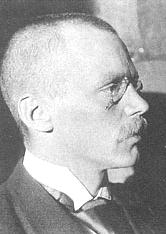 Herman Gorter(1864-1927) Dutch poet who opposed the pro-War stance of the Dutch Social-Democrats and later became a "left-wing communist", conducting a polemic against Lenin's book of that name. See his Open Letter to Lenin.
Herman Gorter(1864-1927) Dutch poet who opposed the pro-War stance of the Dutch Social-Democrats and later became a "left-wing communist", conducting a polemic against Lenin's book of that name. See his Open Letter to Lenin.
 Anton Pannekoek(1873-1960) The Dutch astronomer Anton Pannekoek was active in the German Social Democratic Party while living in Germany before the War and contributed to Die Neue Zeit. The leader of the Social Democrats in the Netherlands, after the Russian Revolution, Pannekoek stayed aloof from both the Comintern and the Socialist Parties, taking a syndicalist direction. See Party and Class.
Anton Pannekoek(1873-1960) The Dutch astronomer Anton Pannekoek was active in the German Social Democratic Party while living in Germany before the War and contributed to Die Neue Zeit. The leader of the Social Democrats in the Netherlands, after the Russian Revolution, Pannekoek stayed aloof from both the Comintern and the Socialist Parties, taking a syndicalist direction. See Party and Class.
Poland
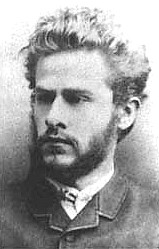 Leo Jogiches
Leo Jogiches
(1867-1919) Jailed for his agitation in Lithuania, in 1890 he escaped to Switzerland where he began a long political and personal relationship with Rosa Luxemburg. In 1983 together they founded the Social Democracy of the Kingdom of Poland (SDKP), which later merged with the Polish Workers' Party. Jogiches was murdered while trying to investigate the assassination of Luxemburg and Karl Liebknecht during the Spartacist uprising.
Russian Social-Democracy
The Russian Social Democratic Labour Party grew out of the Emancipation of Labour Group founded in 1878 by Plekhanov, Vera Zasulich, Pavel Axelrod and others.
The Russian Social Democratic Labour Party
The R.S.D.L.P. was founded in 1901, but at its Second Congress into two factions known as the “Bolsheviks” and the “Mensheviks”. These two factions still operated as parts of a single party as late as 1912.
G V Plekhanov 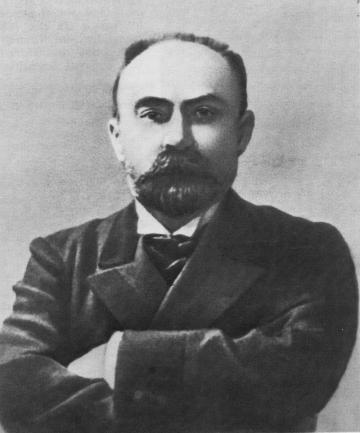 (1856-1918) Left Narodnya Volya, with its focus on the peasantry and terrorist tactics, and founded the Emancipation of Labour Group, with a focus on the urban working class. Forced into emigration in 1880, Plekhanov did not return to Russia until the formation of Provisional Government in 1917.
(1856-1918) Left Narodnya Volya, with its focus on the peasantry and terrorist tactics, and founded the Emancipation of Labour Group, with a focus on the urban working class. Forced into emigration in 1880, Plekhanov did not return to Russia until the formation of Provisional Government in 1917.
Plekhanov was the “father of Russian Marxism”, and up to 1903 Lenin and Plekhanov were allies in the struggle against Bernstein's “evolutionary socialism.” Even after Lenin split with Plekhanov, Plekhanov was held in high regard. However, he did not foresee the possibility of the working class seizing power without Russia first passing through a period of democratic capitalism, and opposed the October Revolution.
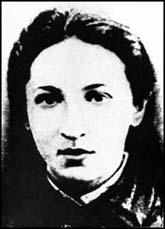 Vera Zasulich(1851-1919) Joined the Narodniks as a youth, but after emigrating in 1880 joined with Plekhanov in the Emancipation of Labour Group. Zasulich translated a number of Marx's works into Russian and with Lenin and Plekhanov as an editor of Iskra. Zasulich was a Menshevik from 1903.
Vera Zasulich(1851-1919) Joined the Narodniks as a youth, but after emigrating in 1880 joined with Plekhanov in the Emancipation of Labour Group. Zasulich translated a number of Marx's works into Russian and with Lenin and Plekhanov as an editor of Iskra. Zasulich was a Menshevik from 1903.
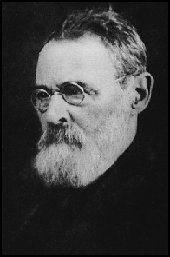 Pavel Axelrod(1850-1928) Influenced by the writings of Bakunin, in 1877 he joined Land and Liberty. When this group established the terrorist Narodnya Volya, he joined instead with Plekhanov in the Emancipation of Labour Group. Axelrod was a Menshevik from 1903.
Pavel Axelrod(1850-1928) Influenced by the writings of Bakunin, in 1877 he joined Land and Liberty. When this group established the terrorist Narodnya Volya, he joined instead with Plekhanov in the Emancipation of Labour Group. Axelrod was a Menshevik from 1903.
 Julius Martov
Julius Martov
(1873-1923) Began his political career in 1895 working with Lenin in the St. Petersburg League of Struggle for the Emancipation of the Working Class and on Iskra but led the Mensheviks in oposition to Lenin's conception of Democratic Centralism in 1903. At the time of the October Revolution he held a left position in the Menshevik ranks, remaining in the Second Congress of the Soviets after the Right SRs and Mensheviks had departed. He emigrated to Berlin and published Sotsialistichesky Vestnik.
The Bolsheviks (See The Bolsheviks Subject Archive). The Bolsheviks, led by Lenin and Zinoviev, were the main force in the Zimmerwald-Left opposition to the First World War, laying the basis for the Communist International formed in 1918.
V I Lenin  (1870-1924) Left Russia to meet with Plekhanov, returning to Russia in order to unite all the revolutionary circles in Russia in a single Party – the R.S.D.L.P.. However, Lenin's conception at this time was for a party of “professional revolutionaries”, rather than the amateurish revolutinary circles or loose labour parties of Europe. Over this issue, Lenin split with all the older generation of Russian Marxists.
(1870-1924) Left Russia to meet with Plekhanov, returning to Russia in order to unite all the revolutionary circles in Russia in a single Party – the R.S.D.L.P.. However, Lenin's conception at this time was for a party of “professional revolutionaries”, rather than the amateurish revolutinary circles or loose labour parties of Europe. Over this issue, Lenin split with all the older generation of Russian Marxists.
Lenin's Bolshevik faction was the centre of opposition to the War at the Zimmerwald Conference. The February Revolution, which brought a social-democratic Provisional Government to power, which continued Russia's participation in the First World War. Returning from exile in April 1917, Lenin called for the overthrow of the Kerensky government and the ending of the War, and led the successful Russian Revolution of October 1917. Lenin died just when power had been secured after the Wars of Intervention.
Leon Trotsky 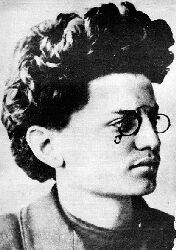 (1879-1940) Worked with Lenin on Iskra in 1902 but broke with Lenin after the Second Congress. He broke with the Mensheviks in 1904 and tried during the next decade to reunite the factions of the RSDLP. In the 1905 revolution, he was the leader of the St. Petersburg Soviet and developed the theory of Permanent Revolution. In 1915 he wrote the Zimmerwald Manifesto.
(1879-1940) Worked with Lenin on Iskra in 1902 but broke with Lenin after the Second Congress. He broke with the Mensheviks in 1904 and tried during the next decade to reunite the factions of the RSDLP. In the 1905 revolution, he was the leader of the St. Petersburg Soviet and developed the theory of Permanent Revolution. In 1915 he wrote the Zimmerwald Manifesto.
Trotsky joined the Bolshevik Party in 1917 and was elected to its Central Committee and led the Military Revolutionary Committee which organised the October Revolution.
The Workers’ Parties in the English-speaking world
The well-established Trade Union movement in Britain and the other English-speaking countries spawned both Parliamentary wings and Anarcho-syndicalist or doctrinaire parties rejecting Parliament. Sections of the Second International were usually smaller parties inside the Labour Parties or outside in opposition to them.
Britain
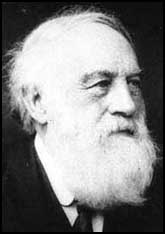 Henry Hyndman (1842-1922). While on holiday in the United States in 1881, he read a copy of Capital and decided to form a Marxist political group when he arrived back in England. The Social Democratic Federation (SDF) became the first Marxist political group in Britain and its members included trade unionists such as Tom Mann, John Burns and Ben Tillett, as well as Eleanor Marx, Edward Aveling, William Morris, George Lansbury and H. H. Champion. By 1885 the organisation had over 700 members.
Henry Hyndman (1842-1922). While on holiday in the United States in 1881, he read a copy of Capital and decided to form a Marxist political group when he arrived back in England. The Social Democratic Federation (SDF) became the first Marxist political group in Britain and its members included trade unionists such as Tom Mann, John Burns and Ben Tillett, as well as Eleanor Marx, Edward Aveling, William Morris, George Lansbury and H. H. Champion. By 1885 the organisation had over 700 members.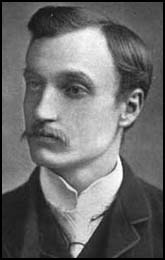
Hyndman's domineering style, adventurous tactics and questionable relations with the Tories weakened the SDF. In December 1884 William Morris and Eleanor Marx left to form the Socialist League. H. H. Champion, Tom Mann and John Burns also left. In February 1900 the SDF joined with the Independent Labour Party of Keir Hardie and Ramsay MacDonald, the Fabian Society and several trade union leaders to form the Labour Representation Committee, later to become the Labour Party.
Hyndman had very little influence and in August 1901 the SDF disaffiliated from the Labour Party and Hyndman established the British Socialist Party (BSP) in 1910 which reaffiliated to the LRC. Hyndman supported Britain’s part in the War and left to form the National Socialist Party.
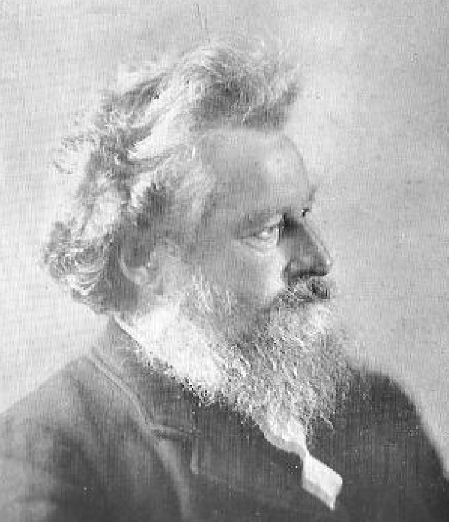
In 1885, Eleanor Marx, William Morris, Ernest Belfort Bax, Edward Aveling and others left Hyndman’s SDF to found the Socialist League and whole branches, such as those in East London, Hammersmith and Leeds, joined the new organisation.
William Morris (1834-1896) A founding member of both Hyndman's Social Democratic Federation, and the Socialist League, where he supported anti-parliamentarian policies. He resigned from the SL in 1890 after it had become dominated by anarchists, but continued his work as a socialist through the Hammersmith Socialist Society.
See A Short Account of the Paris Commune of 1871, by Bax, Morris and Dave.
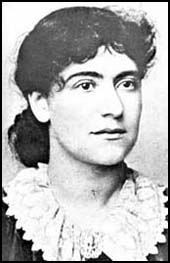 Eleanor Marx (“Tussy”) (1855-1898) Along with translating and acting, Tussy was involved in organizing, writing, record-keeping and speaking for militant trade union such as the Gasworkers, and the Dockers Union. In 1889 she was a delegate in Paris for the founding of the Second International. Later she was involved in editing Marx's papers. She committed suicide in 1898 in disputed circumstances at the age of 43.
Eleanor Marx (“Tussy”) (1855-1898) Along with translating and acting, Tussy was involved in organizing, writing, record-keeping and speaking for militant trade union such as the Gasworkers, and the Dockers Union. In 1889 she was a delegate in Paris for the founding of the Second International. Later she was involved in editing Marx's papers. She committed suicide in 1898 in disputed circumstances at the age of 43.
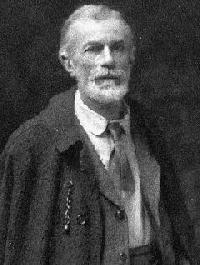
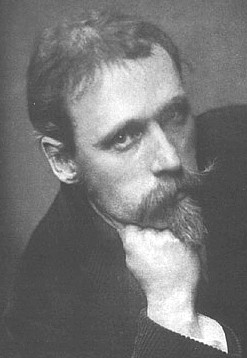 Other well known members of the Socialist League included the author and activist for sexual liberation Edward Carpenterand the artist Walter Crane, who defined the artistic style for socialist propaganda of the period.
Other well known members of the Socialist League included the author and activist for sexual liberation Edward Carpenterand the artist Walter Crane, who defined the artistic style for socialist propaganda of the period.
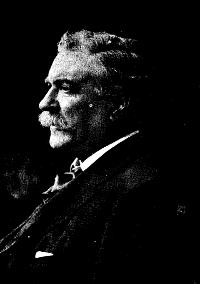 E. Belfort Bax (1854-1925) was the most renowned interpreter of Marx's philosophical and historical ideas in the English language. He joined Hyndman in founding the SDF which he left with Eleanor Marx and William Morris in the breakaway Socialist League, but returned to Hyndman before the demise of the Socialist League.
E. Belfort Bax (1854-1925) was the most renowned interpreter of Marx's philosophical and historical ideas in the English language. He joined Hyndman in founding the SDF which he left with Eleanor Marx and William Morris in the breakaway Socialist League, but returned to Hyndman before the demise of the Socialist League.
See the Belfort Bax archive.
The Voices of Social Democracy in Britain
- Selected articles in Justice, 1884 - 1924
- Articles in Time, 1890 -
- Selected articles in The Clarion on Militarism, 1900
- Articles in To-Day, 1884 - 1889
- Selected articles in Commonweal, 1885 - 1890
- Articles in The Social Democrat and British Socialist, 1897 - 1913.
- Selected translations from Die Neue Zeit, November 1899 - December 1913.
- Articles in The Vanguard, October 1915 - December 1920.
- Articles in The Worker, January 1916.
- Selected articles in The Call, February 1916 - July 1920.
- A Cry from Interned British Women, Women’s Dreadnought, 1916
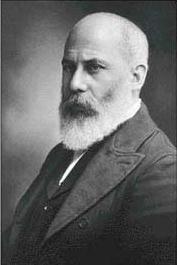 Daniel De Leon
Daniel De Leon
US academic who joined the Socialist Labor Party (originally the American Socialist League) and transformed it from a small propaganda group, based in the European immigrants, to a lively, if doctrinaire party, active in the powerful US workers movement. De Leon participated in the founding of the IWW in the USA in 1905.
See Socialist Labor Party Archive.
Australia
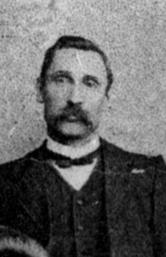 Both Hyndman's S.D.F. and later DeLeon's Socialist Labor Party found their reflections in Australia, but it was the visit of Tom Mann to the colony which led to the development of a Marxist Party, the Victorian Socialist Party.
Both Hyndman's S.D.F. and later DeLeon's Socialist Labor Party found their reflections in Australia, but it was the visit of Tom Mann to the colony which led to the development of a Marxist Party, the Victorian Socialist Party.
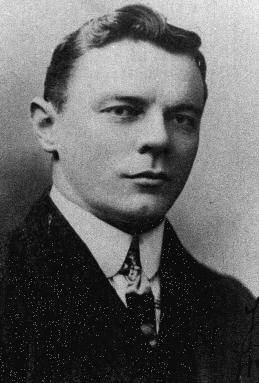
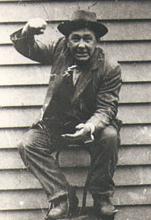 Marxists of the early years of the 20th century included Frank Hyett, John Curtin, Maurice Blackburn, Frank Anstey, Jock Garden and Guido Baracchi.
Marxists of the early years of the 20th century included Frank Hyett, John Curtin, Maurice Blackburn, Frank Anstey, Jock Garden and Guido Baracchi.
The International Workers' Movement |History Archive |M.I.A.
Last updated on 20 October 2025
